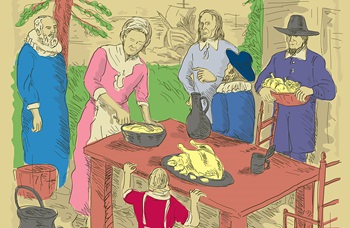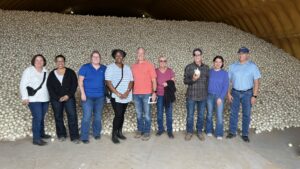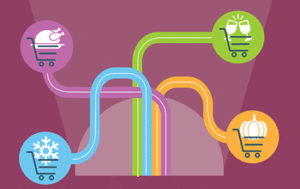<p align="center" style="text-align:center;"><em>For the food industry, the lessons from the first Thanksgiving can still be applied today.</em></p><p>By Leslie G. Sarasin, President and CEO, FMI</p><p>In 1620, 101 passengers aboard the Mayflower completed their 66-day voyage across the Atlantic and anchored at Plymouth Rock. A much-delayed start and rough weather on the journey resulted in a mid-November landing, too late to <img sf-image-responsive="true" src="https://www.fmi.org/images/default-source/blog-images/pilgram-thanksgiving.tmb-large-350-.jpg?Culture=en&sfvrsn=3f51045f_1" height="228" style="max-width:calc(100% – 20px);height:auto;float:right;margin:10px;" title="Pilgrims Thanksgiving" width="350" alt="Illustration of pilgrims having the first Thanksgiving." class="-align-right" />adequately prepare for a harsh New England winter. A year later, disease and the severe conditions had diminished their ranks by half. Over that year, however, they had also been befriended by Squanto, who had helped broker an alliance with the neighboring native Wampanoag tribe. This arrangement was critical as the resident dwellers taught the newcomers valuable survival lessons, such as a new kind of agriculture producing vital new foods of the squash and corn variety. </p><p>Once they had gathered their new foodstuffs in preparation for the challenges of their next New England winter, it occurred to the surviving 50 pilgrims that they should host a harvest festival. Sometime in November of 1621, the remaining pilgrims and 90 members of the Wampanoag tribe, who may or may not have been formally invited, gathered for what we have labelled as the first Thanksgiving. The table of this feast featured venison, fowl, shellfish, squash, corn and other local foods. </p><p>I share all this with you because in this age of travel delays, increasing food prices, frustrations with the government, and other assorted exasperations, it is easy to fall prey to complaining, feeling disillusioned, and bemoaning our plight. I suggest there might be some lessons we can draw from the experiences of our 1621 Mayflower ancestors. </p><ul><li><strong>They chose to celebrate even in the face of ongoing adversity.</strong> They knew the devastating power of the approaching winter months, but they also realized complaining does not lessen the anxiety of anticipated adversity, but joy and gratitude do. </li><li><strong>They offered thanks against the backdrop of decimating losses.</strong> Both parties had recently lost loved ones and friends. Not only had the Mayflower ranks been cut in half, over the span of five years an epidemic had wiped out Squanto’s entire village. Still, the Pilgrims and members of an adjacent Wampanoag tribe came together, opting to not wallow in their grief, but to share a meal and let its gladness become a commemoration to those who had travelled with them. </li><li><strong>They were grateful not because they had arrived, but because they had survived.</strong> Their thanksgiving was a humble celebration of hope over despair, persistence over resignation, and desire over desperation.</li><li><strong>They feasted together, appreciating a bountiful harvest that was a cooperative effort.</strong> Their successful yield was due to hard work, shared labor, and the graciousness of others sharing their knowledge. They ate, deep in the awareness that their lives were reliant on the collaborative work of many. </li></ul><p>Against this historic backdrop, this year as we gather at the Thanksgiving table with our friends and family, I hope we remember:</p><ul><li>Being thankful for the opportunity to face the future is always a better starting point for tackling adversity than letting our own anxiety add to it. </li><li>Grief has its place in the human experience and finding positive ways to express it can bring us together.</li><li>Our lives may be far from perfect, but there is always ample room for gratitude. </li><li>The bounty we enjoy comes from the knowledgeable, dedicated skill of many others: farmers, truck drivers, manufacturers, warehouse laborers, retailers, and countless unnamed others who worked to ensure we have easy access to the foods we love.</li></ul><p>May these important 404-year-old life lessons breathe anew. Please know that this Thanksgiving, I give thanks for you, the work you do and the noble professionals that you are. </p>
[#item_full_content]





